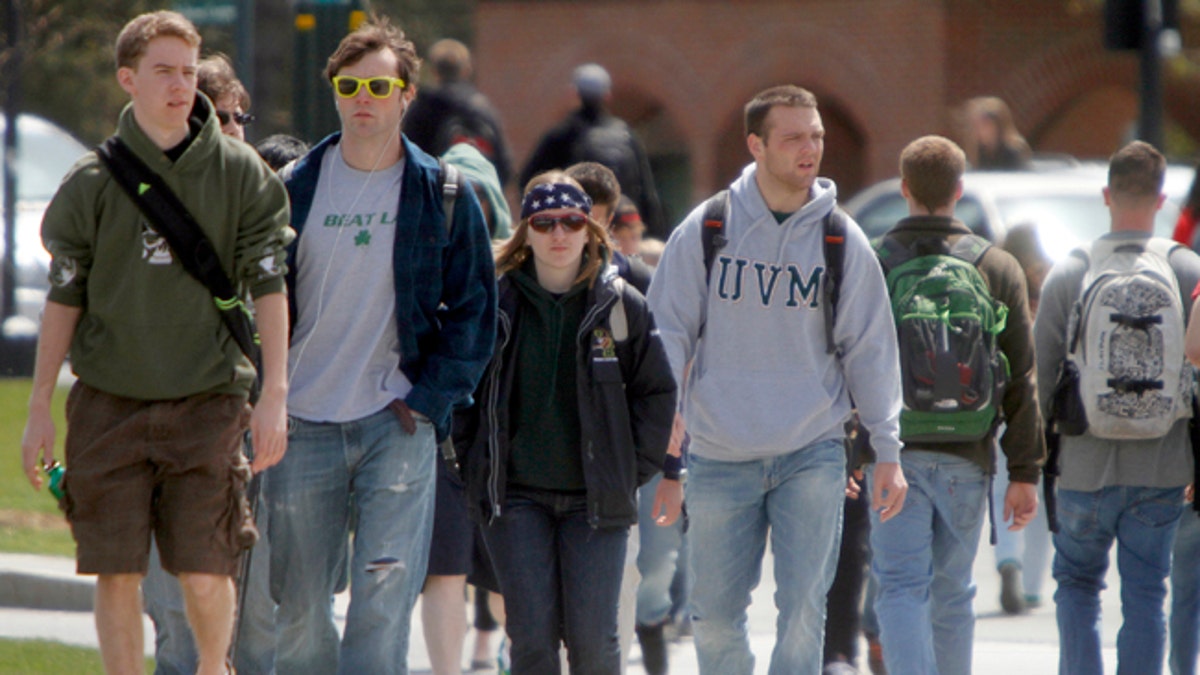
Students walk across campus at the University of Vermont on Monday, April 30, 2012 in Burlington, Vt. U.S. Rep. Peter Welch is compiling stories about student debt. Welch was at the University of Vermont on Monday where he met with students, some of whom are working multiple jobs and studying full time as they accumulate student loan debt. In Vermont, almost 70 percent of college graduates have an average of $30,000 in debt. (AP Photo/Toby Talbot) (AP)
If you thought college was a place for young people to speak out, challenges one another's deeply-held beliefs and grow intellectually, chances are you've never been to Indiana University Southeast.
The school, located just 10 miles north of Louisville, Ky., is the latest college to see its speech code come under fire from a group that advocates freedom of speech on campuses. One stipulation in the code requires that students may only "express opinions" within a free speech zone, which is antithetical to what a college should stand for, according to the Foundation for Individual Rights in Education (FIRE), an advocacy organization which defends the free speech and due process rights of college students.
"It's the price you pay for living in a free society," Robert Shibley, Senior Vice President of FIRE, told FoxNews.com."The entire enterprise of a university is to express scholarly thoughts and opinions...restraints on that are impossible."
[pullquote]
The broad regulation probably doesn't even state what its clumsy crafters meant it to say, said Samantha Harris, FIRE director of speech code research.
"IUS almost certainly doesn't mean this--if you want to tell your friend that you think it's hot outside, you have to go to the zone to do it...it's an indicator of just how poorly written and unconstitutional this policy is," she said.
IUS's code also requires university approval for acts of 'expressed opinions' by submitting an application at least five days in advance.
But the school defended the speech code, expressing concern the exercise of First Amendment rights outside designated zones could disrupt others' pursuit of an education.
“[The guidelines] were intended to provide some guidance on the issue so that those wishing to gather and express an opinion could do so without endangering people or property," the school told FoxNews.com in a statement. "The guidelines also were intended to protect the rights of all students to have unfettered access to educational activities on campus (in other words, the exercise of free speech rights should not result in blocking access to buildings or disrupting classes or campus events)."
The university also said that it has never had any complaints about the policy since its implementation in 2004, and it welcomes the FIRE's feedback.
"We have to regulate other groups who come from off campus. Some come and preach a lot of hate. We just can’t have them wandering around campus with bullhorns over here," Joseph Wert, associate professor of Political Science and Dean of the School of Social Sciences at Indiana University Southwest, told FoxNews.com.
"Governments have the right to restrict the time and place of these things...If they were regulating content--I'd have a problem with that," he continued.
FIRE's second annual "Guide to Free Speech" contains legal information on speech codes and online harassment policies, which it claims are becoming more ubiquitous and restrictive than ever.
"However well-intentioned, such legislation too often fails to respect student speech rights while ignoring colleges previously existing obligations under federal civil rights laws to proscribe truly harassing behavior by universities," the guide states.
"Saying 'we want people to get along and not get offended' leaves these institutions preoccupied by the offense," Shibley said about critics. "Even if you're attempting to set up this private society, it's not reflective of the free society they'll be thrust into in four years."
It's not just Indiana University Southeast. Colorado College, in Colorado Springs, prohibits "any act of ridicule...or embarrassment," and Northeastern University, in Boston, prohibits the use of university computer resources to "transmit or make accessible material, which in the sole judgment of the University is offensive."
"This gives the university carte blanche to censor any electronic communication of which it disapproves," Shibley noted. "You're teaching [college students] that they're not equipped to live in a free society."

